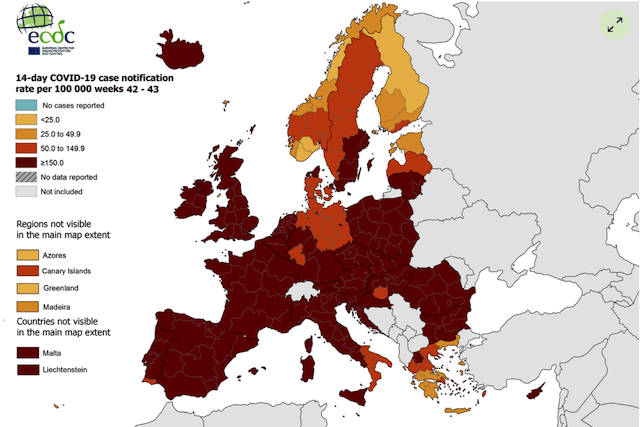Europe accounted for 46% of new infections last week, World Health Organization official Michael Ryan said on Monday, adding that the continent had once again become the epicentre of the SARS-CoV-2 virus outbreak.
As during the first wave in March and April though, there is no unified approach between EU member countries on measures to combat the pandemic.
The Netherlands on 14 October ordered restaurants and bars shut. Shops must close at 8pm and no alcohol can be sold between 8pm and 7am in any premises. Schools are staying open.
Germany opted for a similar, lighter version of lockdown. While shops and schools remain open, sports and culture activities are banned and the hospitality sector has had to close its doors, including hotels which are no longer allowed to accommodate tourists.
Austria followed suit going into partial lockdown for four weeks starting on Tuesday.
In Spain a nationwide lockdown from 11pm to 6am is in place although some regions have the power to impose additional restrictions, as is the case in Catalonia where restaurants and nightlife has shut down.
Italy--where regional authorities in Milan and Naples are pondering lockdown--restaurants and bars need to close at 6pm. Cinemas and concert venues are closed as are gyms.
Greece’s biggest cities are faced with a curfew from midnight until 5am while in Portugal public gatherings and events of more than five people are banned.
Finland, Malta, Hungary and Romania have so far shied away from curfews and partial lockdowns although Hungary’s government announced a cabinet meeting for this week when new measures could be decided amid rising case numbers.
Breaking infection chains
Ireland was one of the first EU countries to go back into what is referred to as a “circuit breaker” lockdown. Non-essentials shops, restaurants, cinemas and other venues are closed for six weeks in hopes that this will stop infection chains from spreading. Schools, however, remain open.
France last week went from regional curfews into a nationwide quasi lockdown. Non-essential shops, including libraries, are closed. Workers have been ordered to work from home with restaurants and bars closed except for take-out. Schools and universities remain open with masks mandatory for children older than six.
In Belgium, restaurants and bars also remain closed with non-essential shops shut and teleworking mandatory until 13 December.
Businesses in Luxembourg--sandwiched between Belgium and France with tighter restrictions--have begun turning cross-border workers away. Fitness studio chain Basic-Fit, for example, is no longer allowing people from Belgium and France to exercise at its Luxembourg outlets, saying this was in line with restrictions in those countries.
Health minister Paulette Lenert meanwhile told broadcaster RTL that Luxembourg would not enter lockdown just because other countries are doing so.
A nightly curfew between 11pm and 6am, and a rule of four came into force on 30 October and the government has said it was preparing contingency measures should the number of new infections not stabilise this week.
This article was originally published in French on Paperjam.lu and has been translated and edited for Delano.
